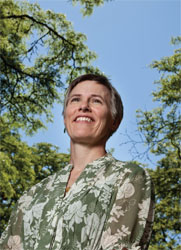Wild Hope Project finds a permanent home in the Center for Vocation at PLU
Wild Hope Project finds a permanent home in the Center for Vocation. At the end of this year, the Lilly Endowment’s $2.5 million, eight-year funding of the Wild Hope Project came to an end. Does that mean the Wild Hope Project is ending? Absolutely not. University funding of this innovative program continues.

Lynn Hunnicutt, associate professor of economics and director of the Center for Vocation. (Photo by John Froschauer)
What’s more, beginning this year, Wild Hope will be a permanent component of the newly created Center for Vocation, with Lynn Hunnicutt, associate professor of economics, as its director. Samuel Torvend ’73, the previous director, stepped down when he was named University Professor of Lutheran Studies. Torvend will advise the center as its director for vocational reflection, a position he has held before.
It means that PLU’s Wild Hope project, and the university’s commitment to exploring ways to help students find meaning and purpose in life – or “vocation”– will become a structuralized part of the university through the Center for Vocation. Thanks to a $500,000 gift from Linda ’63 and Charles Barbo and a $100,000 gift from the Class of 1958, the Center for Vocation, has a growing financial foundation to continue the momentum of the Wild Hope Project. PLU hopes to raise an additional $3.5 million to permanently endow the Center for Vocation.
“The Center for Vocation is the place where students will be able to ask important questions of meaning and purpose in their lives,” Hunnicutt said. “And it is where they will be able to get more information and guidance in devising their own answers.”
Or, to put it in the language of the Mary Oliver poem from which the Wild Hope Project gets its name, the Center for Vocation will be the place for students to consider “what they will do with their one wild and precious life.”
Indeed, it is hard to find a student on campus who can’t recite that signature line of the Mary Oliver poem. And more importantly, many of those same students strive to live it.
That this theme has such resonance with students is an indication of why Wild Hope has always received high praise from the Lilly Endowment. PLU has integrated Wild Hope and its “big enough questions” across campus, through guest speakers, career fairs, service learning workshops and more. Many of its initiatives, particularly programs that foster the growth of first-year students, like The First-Year Experience and the J-Term retreat “Explore!,” have been called out for high praise.
More recently, thanks to the Class of 1958, Wild Hope’s Meant to Live program has been endowed to bring together students and alumni during Homecoming to discuss issues of vocation. This gives PLU students the chance to see how vocation is lived out by its alumni, and gives alumni the chance to think about how their own vocations have evolved through their lives.
They all have the similar goal of, as Torvend likes to say, “allowing students, faculty, and staff to pause and ponder meaning and purpose in life – something few places cultivate.”
The Center for Vocation will also focus on training faculty and staff through workshops, study seminars on Lutheran Higher education and the like. Early on, organizers realized that, to be truly impactful, PLU needed to support faculty and staff – after all, they are the ones who are here year-after-year.
“We have worked to train our faculty so we can help our students ask questions of meaning and purpose, to develop our skills to mentor students,” Hunnicutt said. “That’s what sets this university apart.”
The result has been a successful integration of these questions of meaning and purpose campuswide – in the classrooms, in student orientation, in career and academic advising, in residential life – just about everywhere.
“The Wild Hope Project and the Center for Vocation are places at PLU where we can work to make sure we are all rowing in the same direction,” Hunnicutt added.
And thanks to the Lilly Endowment, generous benefactors to the university, and the commitment of the faculty and staff of PLU – all who want to encourage students to continue to ask those questions of vocation – PLU will be rowing that way for a long time.


